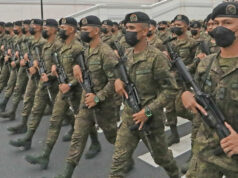Assistance continue to pour in as Cotabato’s earthquake victims await permanent relocation
FAMILIES IN Cotabato whose homes were totally destroyed or their community declared as a no-build zone following last year’s series of earthquakes continue to get assistance through transitional shelters and support at the evacuation centers. Last week, 47 families from villages in Bulutukan town received their temporary homes built through the Diocese of Kidapawan under the provincial government’s adopt-a-home project, which is part of rehabilitation program. The provincial government, in a statement, said the diocese partnered with NASSA/CARITAS, Coca-Cola Foundation, and Aecid (Agencies Española de Cooperation International para el Desarrollo) for the construction of the shelters.
UNICEF
The United Nations Children’s Fund (UNICEF) has also been helping those who are still in evacuation centers as well as families rebuilding their partially destroyed homes, with particular focus on hygiene, sanitation, and health. “People affected by disasters are more at risk to diseases especially diarrhoea which can be life threatening for children. We need to make sure that risks of water-borne diseases are reduced and give this high priority as part of our emergency response,” UNICEF WASH (Water, Sanitation, Hygiene, and Education) Officer Rasul Abdullah said in a statement. UNICEF, with support from the UN Central Emergency Response Fund, has set up water supply points in evacuation centers, providing daily drinking water supply to children, hygiene kits, and conducting hygiene promotion sessions. For rebuilding, the group has been distributing hardware supplies such as toilet bowls, cement, doors, steel bars and nails.
VALIDATION
The provincial government’s Cotabato Rebuilding Program was formally launched last Feb. 11, with implementation on a per-village basis while the multi-sector task force continues to conduct validation and assessment in other areas. The fully validated data is required to access the P5 billion fund allocated by the national government for the rehabilitation of earthquake-hit areas in the regions of Davao and South Cotabato-Cotabato-Sultan Kudarat-Sarangani-General Santos City (SOCCSKSARGEN). Out of the almost 260,000 people affected by the three major tremors in October, more than 162,000 are in Cotabato, according data from the national disaster management council. — Mindanao Bureau



